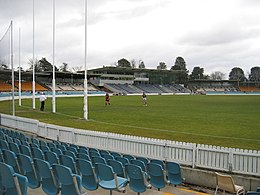| Australian rules football in the Australian Capital Territory | |
|---|---|
 Goal posts at Manuka Oval in 2006, home of Australian rules football in Canberra | |
| Governing body | AFL Canberra, AFL NSW/ACT |
| Representative team | Australian Capital Territory |
| First played | Canberra 29 July 1911 |
| Registered players | 9,129 (adult) 2,953 (child)[1] |
Club competitions | |
Audience records | |
| Single match | 14,974 (4 June 2016), AFL Greater Western Sydney Giants v Richmond Football Club (Manuka Oval, Canberra) |
In the Australian Capital Territory (ACT), Australian rules football is a popular spectator and participation sport which has been played continuously since 1911. It was the most popular football code in the nation's capital Canberra between 1978 and 1982 and has the second highest participation after soccer. The current governing body is AFL Canberra founded 1922, while the development body is AFL NSW/ACT established in 1999.
Until 1982, the sport was widely covered in the local media and the premier local competition attracted significant interest. The ACT was one of the first proponents for a national Australian rules football competition, now known as the Australian Football League (AFL) and it became the first state or territory outside of Victoria to make an official bid to join the league. The (rejected) Canberra bid in 1981 was dismissed in favour of a team in Sydney, which became the Sydney Swans. Canberra has made numerous failed bids since, including bids to move the Swans when they became insolvent. However, the popularity of Australian rules football suffered substantially after the introduction of the Raiders (in 1982) and Brumbies (in 1996). As a result rugby league and rugby union there receive higher attendances and overall interest despite significantly lower participation rates. It is now classified as a minor sport with the lowest media profile and attendance of the four major football codes.
While it remains by far the second most participated football code and retains a loyal support base as well as a strong local competition, it has continued its slow decline since the 1980s. The ACT hosted its first AFL match in 1995 and AFL matches have been played every year since 2001 except 2020. Since 2012 the AFL has positioned Greater Western Sydney Giants (GWS) as a local side, scheduling three home games a year at Manuka Oval. In 2013, 2016, 2021 and 2022 the stadium's average attendance was higher than that of the Giants home, the Sydney Showgrounds, despite having 10,000 less available seats and a schedule of lower drawing opposition clubs. At least 6,400 GWS members were ACT-based at the end of 2022.[2][3] The club in 2015 set a target to overtake the Raiders membership in 2018 with more than 10,000+ ACT-based members,[4] however Raiders membership rapidly outpaced it growing its record to more than quadruple that of GWS.[5]
The ACT debuted at representative level in 1925 against New South Wales but has not appeared since 1988. Its first win came in 1941 against New South Wales; it also went on to defeat Queensland and the National Amateur team numerous times between the 1950s and 1980s culminating in defeats of the powerhouses of the VFL in 1980 and Tasmania in 1981. Kevin "Cowboy" Neale captained the side to many of these victories. The junior side was the third team to enter the Teal Cup in 1973.
Home grown hero Alex Jesaulenko and Australian Football Hall of Fame legend was a household name in the 1970s in Canberra. Jesaulenko has played more games and kicked more goals in the AFL than any other player from the ACT. James Hird is the only Canberran to win the prestigious Brownlow Medal. Both are multi premiership players. Britt Tully (games) and Jacqueline Parry (goals) share the honours in the AFLW. The ACT is classed as a development region by the AFL and in the AFL Draft, ACT is designated priority AFL recruitment zoning for the Greater Western Sydney Giants (and previously Sydney Swans), so most of the local players recruited from the ACT to the AFL (unless overlooked) generally start their careers at one of these two New South Wales based clubs.
- ^ Cite error: The named reference
participation 2023/24was invoked but never defined (see the help page). - ^ GWS Giants eye new 10-year deal with ACT government from Canberra Times 18 Apr 2022
- ^ Landmark Long-Term Partnership Extension with ACT Government by GIANTS Media 11 December 2022
- ^ Giants boss David Matthews aiming for 10,000 Canberra Canberra Times 20 Apr 2015
- ^ Raiders set new membership record in 2022 from Raiders.com.au 22 July 2022